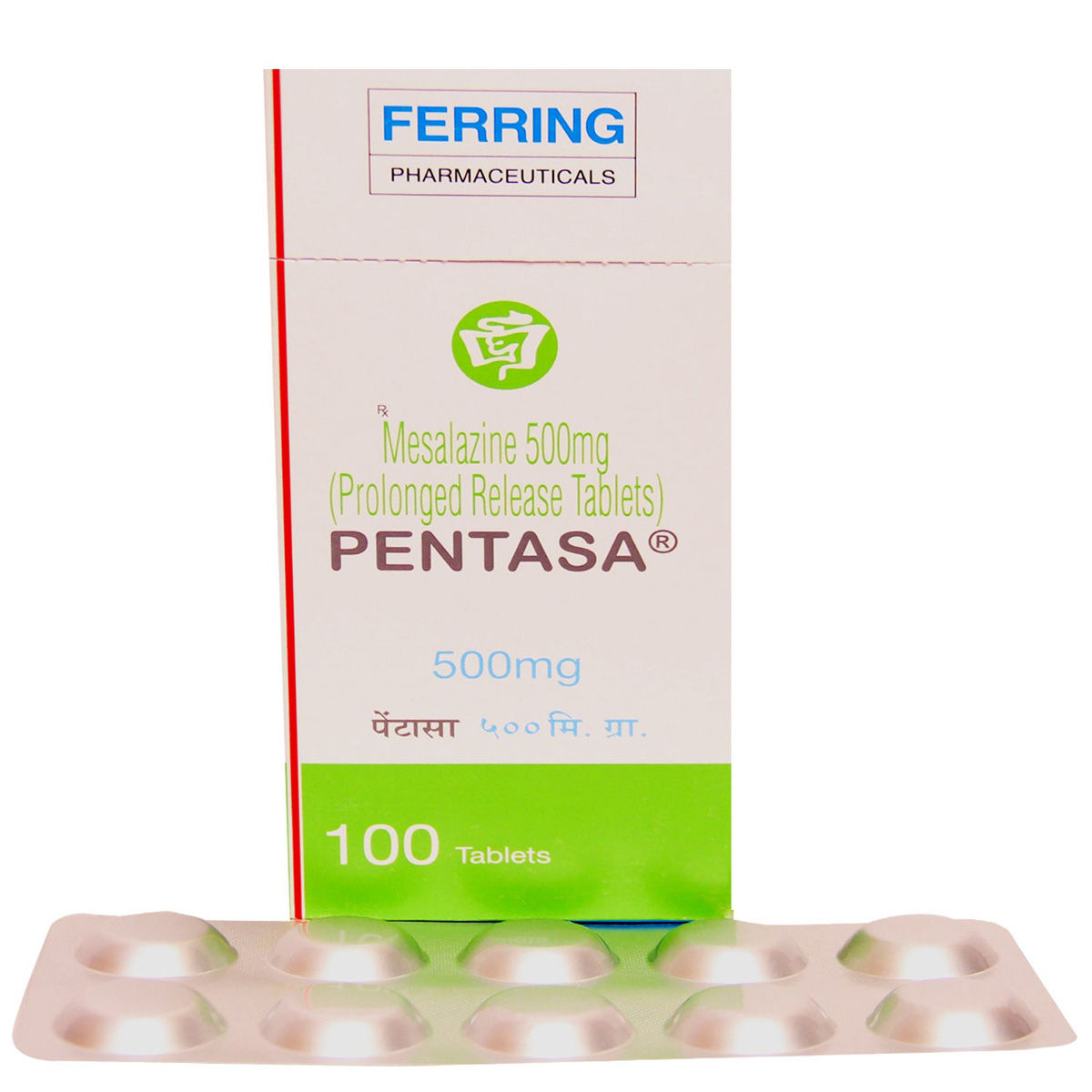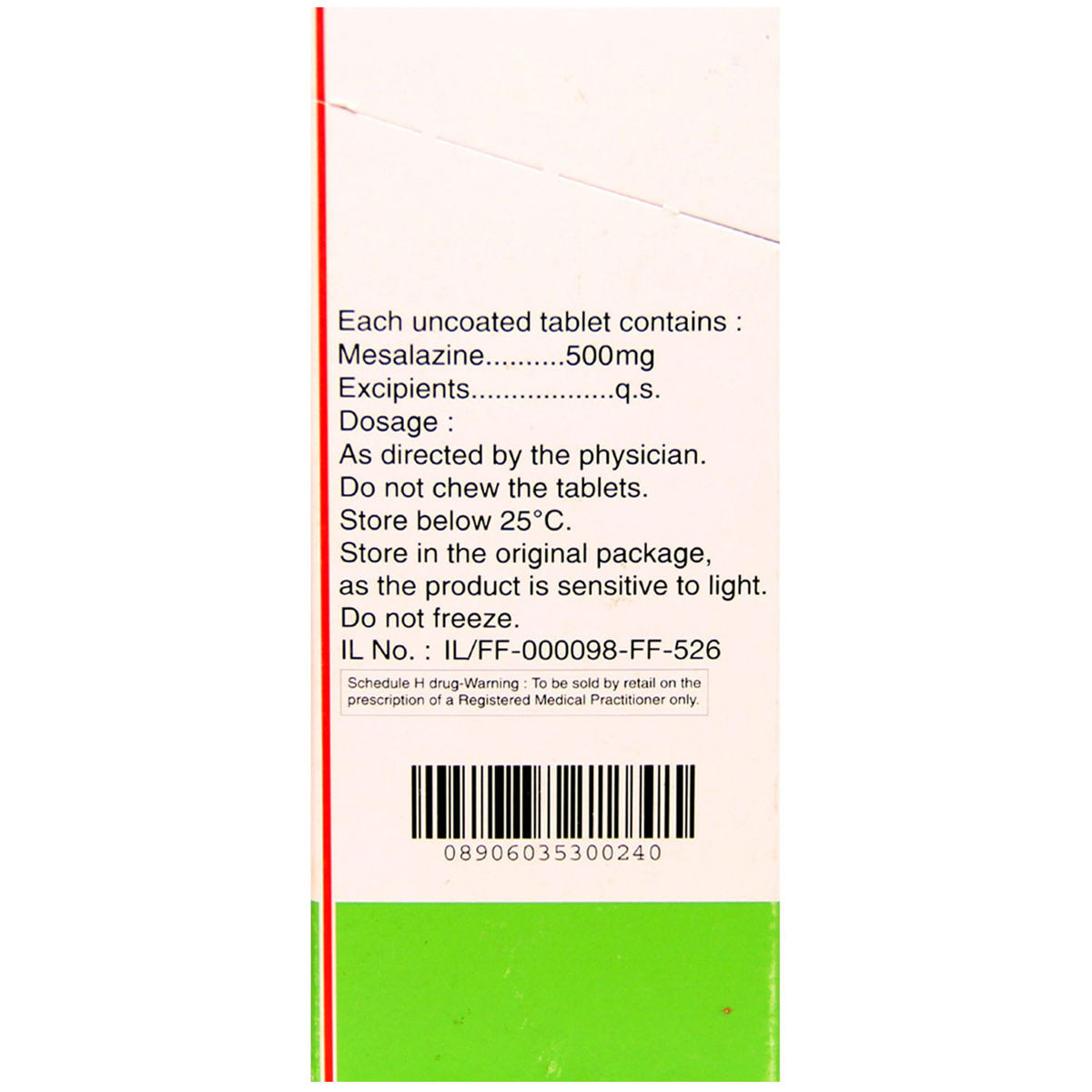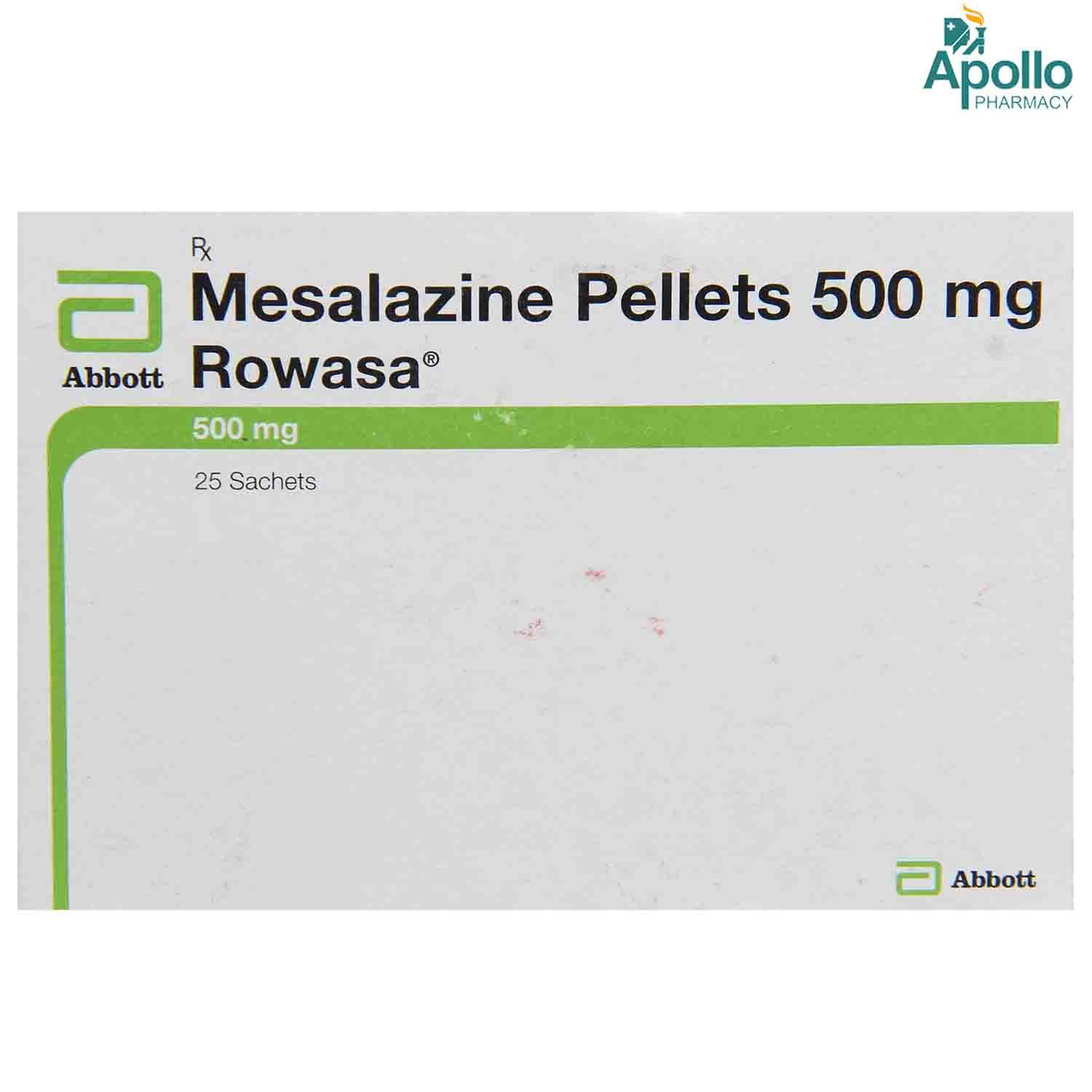Pentasa 500 mg Tablet 10's


₹247.7*
MRP ₹281.5
12% off
₹247.72*
MRP ₹281.5
12% CB
₹33.78 cashback(12%)
Free Delivery
With Circle membership
(Inclusive of all Taxes)
This offer price is valid on orders above ₹800. Apply coupon PHARMA10/PHARMA18 (excluding restricted items)
Pentasa 500 mg Tablet is used to treat Ulcerative colitis and Crohn's disease. It contains Mesalazine, an anti-inflammatory drug. It works by inhibiting the production of certain chemical substances, such as prostaglandins, that cause pain and swelling. This helps reduce inflammation (redness and swelling) in the intestines and relieves stomach pain or bleeding symptoms. Also, it may prevent further episodes of ulcerative colitis.
Know Your Delivery Time
Provide Delivery Location
Available Offers
 Prescription drug
Prescription drugWhats That

Secure Payment

India's Most Trusted Pharmacy

Genuine Products
Composition :
Manufacturer/Marketer :
Consume Type :
Return Policy :
Expires on or after :
About Pentasa 500 mg Tablet
Pentasa 500 mg Tablet belongs to a class of drugs called 'anti-inflammatory drugs used to treat ulcerative colitis and Crohn’s disease. Ulcerative colitis is a type of chronic inflammatory bowel disease that causes inflammation of the large intestine lining (colon). It produces ulcers on the colon's lining, which may cause bleeding and discharge of pus and mucus.
Pentasa 500 mg Tablet contains Mesalazine, which works by inhibiting the production of certain chemical substances, such as prostaglandins, that cause pain and swelling. Thereby, it reduces inflammation (swelling) in the intestines and provides relief from symptoms such as stomach pain or bleeding.
Take Pentasa 500 mg Tablet as prescribed. You are advised to use Pentasa 500 mg Tablet for as long as your doctor has recommended it for you based on your medical condition. In some cases, you may experience diarrhoea, stomach pain, headache, nausea, vomiting or flatulence (gas). Most of these side effects of Pentasa 500 mg Tablet do not require medical attention and gradually resolve over time. However, if the side effects persist or worsen, please consult your doctor.
Avoid taking Pentasa 500 mg Tablet if you are allergic to Mesalazine or any other medicines. Pentasa 500 mg Tablet should be used with caution in the elderly. If you are pregnant or breastfeeding, please inform your doctor before taking Pentasa 500 mg Tablet . Avoid taking Pentasa 500 mg Tablet if you have severe kidney failure. If you have stomach pain or cramps, severe headache, fever or rash, stop taking Pentasa 500 mg Tablet immediately and consult a doctor.
Uses of Pentasa 500 mg Tablet
Directions for Use
Swallow the tablet as a whole with a glass of water. Do not crush, chew or break it.
Medicinal Benefits
Pentasa 500 mg Tablet contains Mesalazine, an anti-inflammatory drug used in the treatment of ulcerative colitis and Crohn’s disease. It works by inhibiting the production of certain chemical substances, such as prostaglandins, that cause pain and swelling. Thereby helping in reducing inflammation (redness and swelling) in the intestines and providing relief from symptoms such as stomach pain or bleeding. Also, Pentasa 500 mg Tablet may prevent further episodes of ulcerative colitis.
How Pentasa 500 mg Tablet Works
Storage
- Eating and drinking slowly can help swallow less air, which reduces burps.
- Avoid consuming foods like gum and hard candy and drinking carbonated drinks as they release carbon dioxide gas in your body.
- Prevent smoking as it can impact your whole body.
- Seek medical help to treat gastric problems and heart burn that may lead to frequent burps.
- Check your dentures because if they are loosely fit, excess air can be swallowed that causes burbs more frequently.
- If you have bowel inflammation, eat smaller quantities and more frequent meals.
- Eat slowly and chew your food thoroughly to help digestion.
- Eat fiber-rich foods such as fruits, whole grains, and vegetables to promote regular bowel movements.
- Avoid gas-producing foods like cabbage, beans, broccoli and carbonated drinks.
- Drink lots of water throughout the day to prevent dehydration and aid digestion.
- Do regular exercise to enhance digestion and reduce bloating.
- Apply a hot/cold pack to the affected area.
- Doing gentle exercises can help cope with pain by stretching muscles.
- Get enough sleep. It helps enhance mood and lower pain sensitivity.
- Avoid alcohol, smoking and tobacco as they can increase pain.
- Follow a well-balanced meal.
- Meditation and massages may also help with pain.
- Inform your doctor about the common cold symptoms you're experiencing due to medication.
- Your doctor may adjust your treatment plan, which could include changing your medication, adding new medications, or offering advice on managing your symptoms.
- Practice good hygiene, including frequent handwashing, avoiding close contact with others, and avoiding sharing utensils or personal items.
- Drink plenty of fluids, such as warm water or soup, to help thin out mucus.
- Get plenty of rest and engage in stress-reducing activities to help your body recover. If your symptoms don't subside or worsen, consult your doctor for further guidance.
- Hydrate your body: Drink enough water to prevent dehydration and headaches.
- Calm Your Mind: Deep breathing and meditation can help you relax and relieve stress.
- Rest and Recharge: Sleep for 7-8 hours to reduce headache triggers.
- Take rest: lie down in a quiet, dark environment.
- Cold or warm compresses can help reduce tension.
- Stay Upright: Maintain good posture to keep symptoms from getting worse.
- To treat headaches naturally, try acupuncture or massage therapy.
- Over-the-counter pain relievers include acetaminophen and ibuprofen.
- Prescription Assistance: Speak with your doctor about more substantial drug alternatives.
- Severe Headaches: Seek emergency medical assistance for sudden, severe headaches.
- Frequent Headaches: If you get reoccurring headaches, consult your doctor.
- Headaches with Symptoms: Seek medical attention if your headaches include fever, disorientation, or weakness.
- Inform your doctor about dizziness symptoms. They may adjust your medication regimen or prescribe additional medications to manage symptoms.
- Follow your doctor's instructions for taking medication, and take it at the same time every day to minimize dizziness.
- When standing up, do so slowly and carefully to avoid sudden dizziness.
- Avoid making sudden movements, such as turning or bending quickly, which can exacerbate dizziness.
- Drink plenty of water throughout the day to stay hydrated and help alleviate dizziness symptoms.
- If you're feeling dizzy, sit or lie down and rest until the dizziness passes.
- Track when dizziness occurs and any factors that may trigger it, and share this information with your doctor to help manage symptoms.
- Report the itching to your doctor immediately; they may need to change your medication or dosage.
- Use a cool, damp cloth on the itchy area to help soothe and calm the skin, reducing itching and inflammation.
- Keep your skin hydrated and healthy with gentle, fragrance-free moisturizers.
- Try not to scratch, as this can worsen the itching and irritate your skin.
- If your doctor prescribes, you can take oral medications or apply topical creams or ointments to help relieve itching.
- Track your itching symptoms and follow your doctor's guidance to adjust your treatment plan if needed. If the itching persists, consult your doctor for further advice.
Drug Warnings
If you are allergic to Mesalazine or any other medicines, please tell your doctor. Pentasa 500 mg Tablet should be used with caution in the elderly. If you are pregnant or breastfeeding, please inform your doctor before taking Pentasa 500 mg Tablet . Avoid taking Pentasa 500 mg Tablet if you have severe kidney failure. Severe skin reactions such as toxic epidermal necrolysis (skin peeling and blistering) or Stevens-Johnson syndrome (a painful rash that spreads and blisters) can occur in some patients taking Pentasa 500 mg Tablet . Therefore, if you notice any skin reactions while taking Pentasa 500 mg Tablet , please consult a doctor immediately. If you have stomach pain or cramps, severe headache, fever or rash, stop taking Pentasa 500 mg Tablet immediately and consult a doctor. Avoid taking Pentasa 500 mg Tablet if you have had blood abnormalities or kidney problems while taking other medicines such as Sulphasalazine.
Drug-Drug Interactions
Drug-Drug Interactions
Login/Sign Up
Co-administration of Pentasa 500 mg Tablet with Cidofovir can increase the risk of kidney problems.
How to manage the interaction:
Taking Pentasa 500 mg Tablet with Cidofovir is generally avoided as it can possibly result in an interaction, it can be taken if a doctor has advised it. However, if you experience increased or decreased urination, sudden weight gain or loss, shortness of breath, consult a doctor. Do not discontinue any medications without consulting a doctor.
Co-administration of Iomeprol with Pentasa 500 mg Tablet may increase the risk of kidney problems.
How to manage the interaction:
Although, there is a possibility of interaction between Pentasa 500 mg Tablet and Iomeprol they can be taken together if your doctor has prescribed them. Consult a doctor immediately if you experience any symptoms such as swelling in feet and ankles, urinating either too much or too little. Do not discontinue any medication without consulting a doctor.
Co-administration of omeprazole with Pentasa 500 mg Tablet can decrease the effects of Pentasa 500 mg Tablet.
How to manage the interaction:
There could be a possible interaction between Pentasa 500 mg Tablet and omeprazole, but they can be taken together if a doctor has prescribed them. Do not discontinue any medications without consulting a doctor.
Co-administration of Ranitidine with Pentasa 500 mg Tablet can decrease the levels of Pentasa 500 mg Tablet, which may be less effective in treating a condition.
How to manage the interaction:
There may be a possible interaction between Pentasa 500 mg Tablet with Ranitidine, but they can be taken together if a doctor has prescribed them. Do not discontinue any medications without consulting a doctor.
Co-administration of Metrizamide with Pentasa 500 mg Tablet may increase the risk of kidney problems.
How to manage the interaction:
Although, there is a possibility of interaction between Pentasa 500 mg Tablet with Metrizamide they can be taken together if a doctor has prescribed them. Consult a doctor immediately if you experience any symptoms such as swelling in feet and ankles, dry, itchy skin, urinating either too much or too little. Do not discontinue any medication without consulting a doctor.
Co-administration of Nizatidine with Pentasa 500 mg Tablet can decrease the level or effect of Mesalamine by increasing gastric pH.
How to manage the interaction:
Although there may be a possible interaction between Pentasa 500 mg Tablet with Nizatidine, they can be taken together if a doctor has prescribed them. Do not discontinue any medications without consulting a doctor.
Co-administration of Deferasirox with Pentasa 500 mg Tablet may increase the risk of kidney problems.
How to manage the interaction:
Although there is a possibility of interaction between Pentasa 500 mg Tablet and Deferasirox but they can be taken together if a doctor has prescribed them. Consult a doctor immediately if you experience any symptoms such as increased or decreased urination, abrupt weight gain or loss, weakness, or dizziness. Do not discontinue the medication without consulting a doctor.
Co-administration of Tenofovir alafenamide with Pentasa 500 mg Tablet may increase the risk of kidney problems.
How to manage the interaction:
There is a possibility of interaction between Pentasa 500 mg Tablet with Tenofovir alafenamide, but they can be taken together if a doctor has prescribed them. Consult a doctor immediately if you experience increased or decreased urination, swelling, shortness of breath, bone pain, cramping in the muscles. Do not discontinue the medication without consulting a doctor.
Co-administration of Iodamide with Pentasa 500 mg Tablet may increase the risk of kidney problems.
How to manage the interaction:
Although, there is a possibility of interaction between Mesalamine with Iodamine they can be taken together if a doctor has prescribed them. Consult a doctor immediately if you experience any symptoms such as swelling in feet and ankles, itchy skin, shortness of breath, urinating either too much or too little. Do not discontinue any medication without consulting a doctor.
Drug-Food Interactions
Drug-Food Interactions
Login/Sign Up
Diet & Lifestyle Advise
- Maintain a low-fat diet and eat foods rich in vitamin C, such as bell peppers, spinach, parsley and berries, which help in healing faster.
- Include olive oil and omega-3 fatty acids. Eat more fibre-rich foods such as fruits and vegetables.
- Limit dairy intake as your body may develop difficulty digesting certain dairy products when you are affected with Crohn’s disease, which leads to stomach cramps, diarrhoea or stomach upset.
- Drink plenty of water to prevent dehydration.
Habit Forming
Therapeutic Class
Pentasa 500 mg Tablet Substitute

Mesacol Suppository 7's
by Others
₹21.16per tabletRowasa 500 mg Sachet 1's
by Others
₹31.50per tabletMesacol CR 500 mg Tablet 10's
by AYUR
₹20.70per tabletMeslataj Suppository
by Others
₹15.30per tabletMeslataj 500mg Pellets
by Others
₹49.50per tablet
Product Substitutes
Alcohol
Consult your doctor
The interaction of alcohol with Pentasa 500 mg Tablet is unknown. If you have concerns, please discuss them with your doctor before taking Pentasa 500 mg Tablet .
Pregnancy
Consult your doctor
Pentasa 500 mg Tablet is a Category B pregnancy drug and is given to pregnant women only if the doctor thinks the benefits outweigh the risks. Please consult your doctor if you are pregnant or planning for pregnancy before taking Pentasa 500 mg Tablet .
Breast Feeding
Caution
Pentasa 500 mg Tablet should not be taken by breastfeeding mothers unless advised by the doctor. Granules form of Mesalazine may cause allergic reactions such as diarrhoea in newborn babies after breastfeeding. If this happens, discontinue breastfeeding.
Driving
Safe
Pentasa 500 mg Tablet usually does not affect your ability to drive or operate machinery.
Liver
Consult your doctor
Please consult your doctor if you have liver problems before using Pentasa 500 mg Tablet .
Kidney
Caution
Pentasa 500 mg Tablet should be used with extreme caution in patients with mild to moderate kidney impairment. Avoid taking Pentasa 500 mg Tablet if you have severe kidney impairment.
Children
Caution
Pentasa 500 mg Tablet is not recommended for children below two years. However, Pentasa 500 mg Tablet should be given to children only if recommended by a doctor.
FAQs
Pentasa 500 mg Tablet is used to treat Ulcerative colitis and Crohn's disease.
Pentasa 500 mg Tablet contains Mesalazine, which works by inhibiting the production of certain chemical substances, such as prostaglandins, that cause pain and swelling. Thereby helps in reducing inflammation (swelling) in the intestines and provides relief from symptoms such as stomach pain or bleeding.
You are not recommended to take Pentasa 500 mg Tablet with Ibuprofen as co-administration of these two medicines may increase the risk of kidney problems. However, please consult your doctor before taking Pentasa 500 mg Tablet with other medicines.
Yes, Pentasa 500 mg Tablet may cause kidney stones in some patients. It is not necessary for everyone taking Pentasa 500 mg Tablet to experience this side effect. However, if you notice blood in urine or pain in the sides of the stomach, please consult a doctor immediately. Drink adequate water while taking Pentasa 500 mg Tablet to prevent kidney stones.
Pentasa 500 mg Tablet should be used with caution in patients with stomach ulcers as it may increase the risk of worsening the condition. Therefore, please inform your doctor if you have a stomach ulcer before taking Pentasa 500 mg Tablet .
Yes, Pentasa 500 mg Tablet may cause diarrhoea as a common side effect. However, if the condition persists and worsens with fever, watery stools or consistent stomach pain, please consult a doctor. Also, drink plenty of water while taking Pentasa 500 mg Tablet to prevent dehydration.
Country of origin
Manufacturer/Marketer address
Customers Also Bought
Disclaimer
Author Details
We provide you with authentic, trustworthy and relevant information
Recommended for a 30-day course: 3 Strips































